Abstract
The hypolipidaemic efficacy and safety of ciprofibrate were compared with a sustained-release formulation of bezafibrate (Bezalip Mono) in 174 patients with type II hyperlipidaemia. This multicenter, open, parallel-group study was conducted in general practice. A total of 83 patients received 100 mg ciprofibrate once daily and 91 received 400 mg bezafibrate once daily for eight weeks. Concentrations of total cholesterol, low-density lipoprotein cholesterol, high-density lipoprotein cholesterol, and triglycerides were measured at baseline (after stabilisation on a lipid-lowering diet) and after eight weeks. Safety was assessed from reports of adverse events and by measuring haematological and biochemical parameters. After eight weeks, ciprofibrate produced a significantly greater decrease in total cholesterol (-17.8% vs -12.5%), low-density lipoprotein cholesterol (-22.4% vs -17.2%), and triglycerides (-33.9% vs -26.1%). High-density lipoprotein cholesterol concentrations were increased significantly by both drugs (19.6% with ciprofibrate, 24.9% with bezafibrate) but the differences between drugs were non-significant. Both drugs were well tolerated, with headache the most widely reported adverse event.
Full text
PDF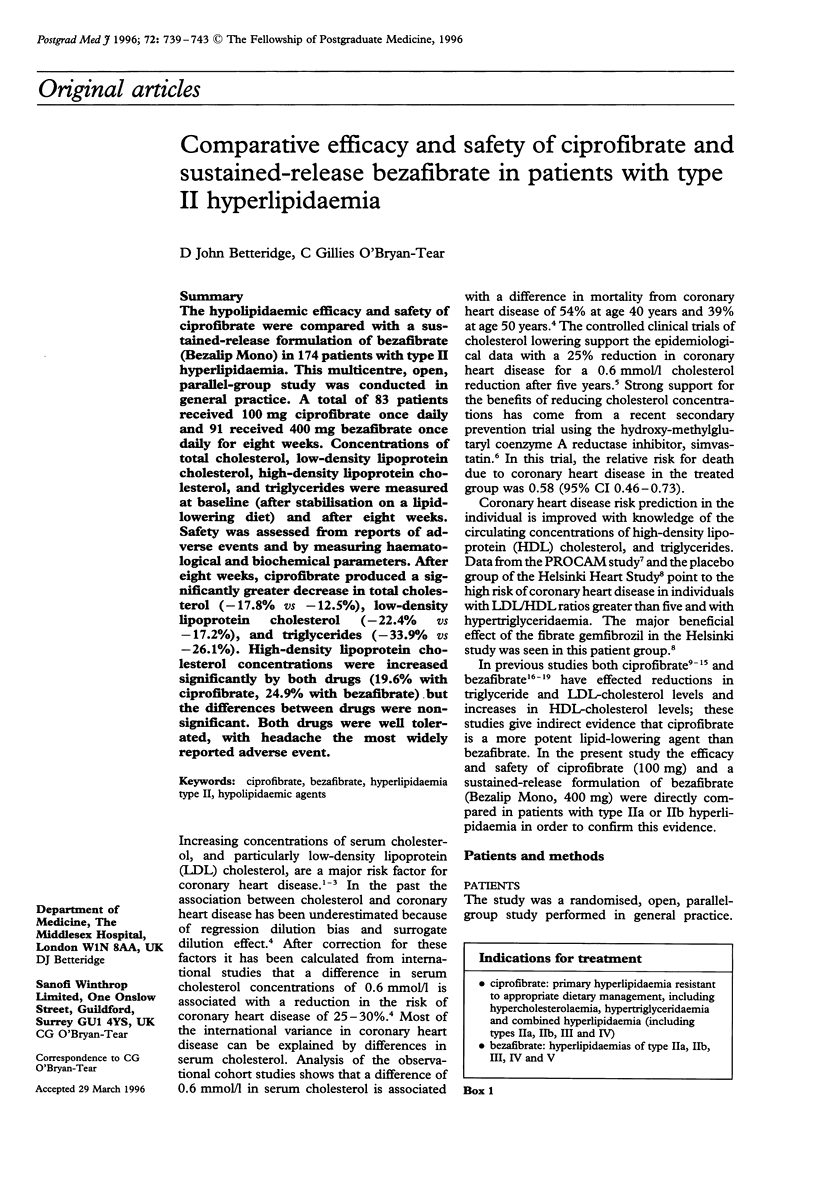
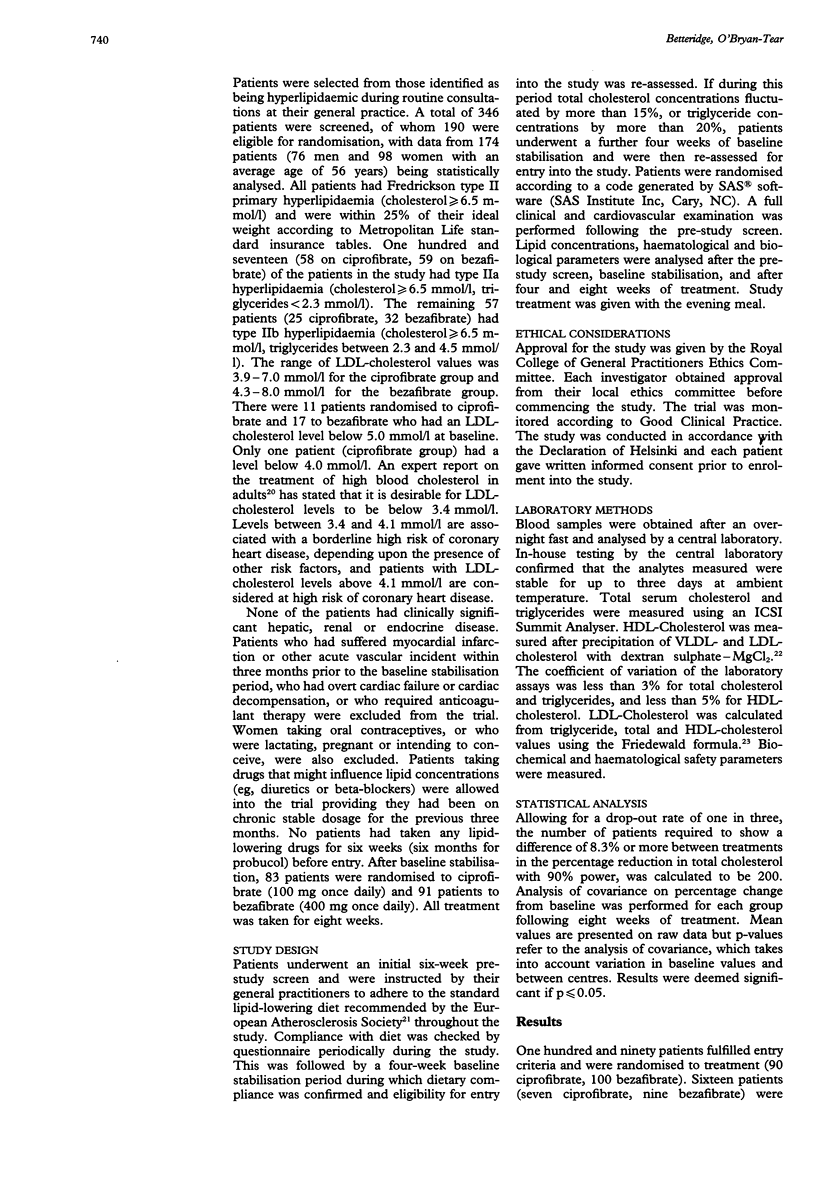
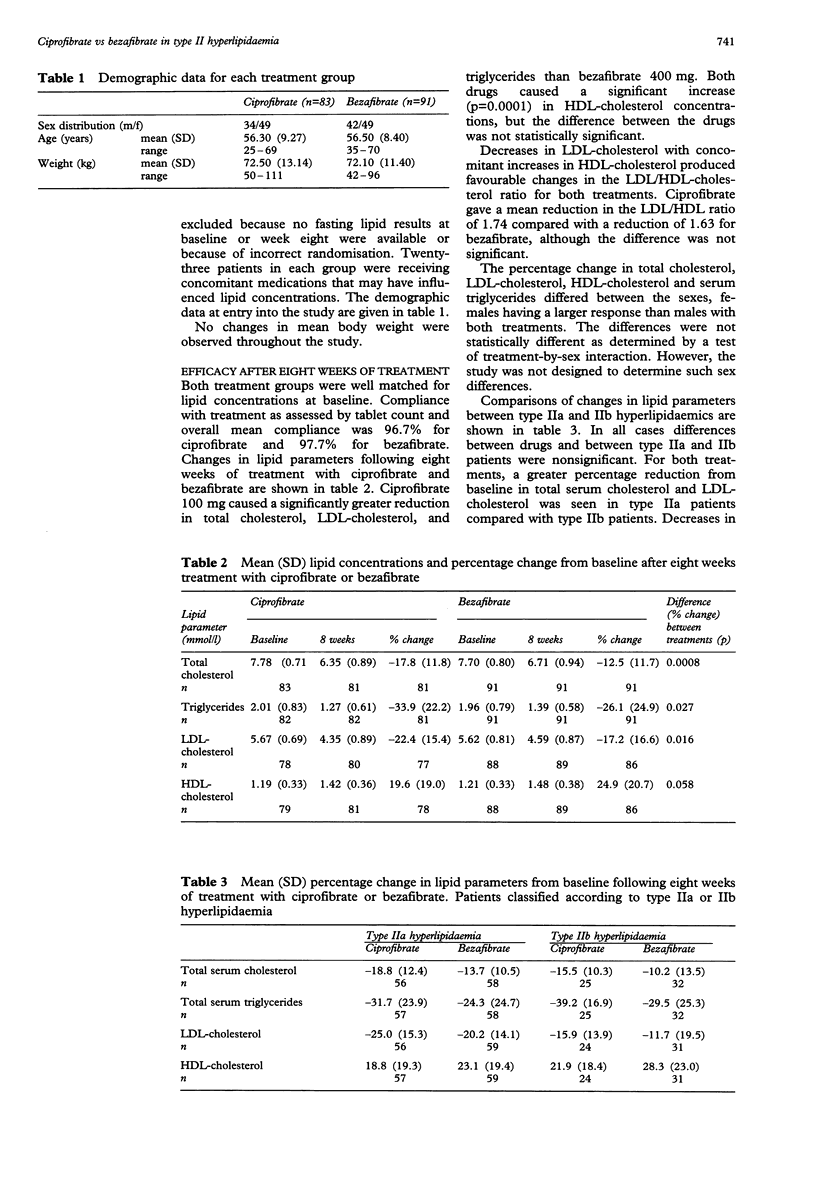
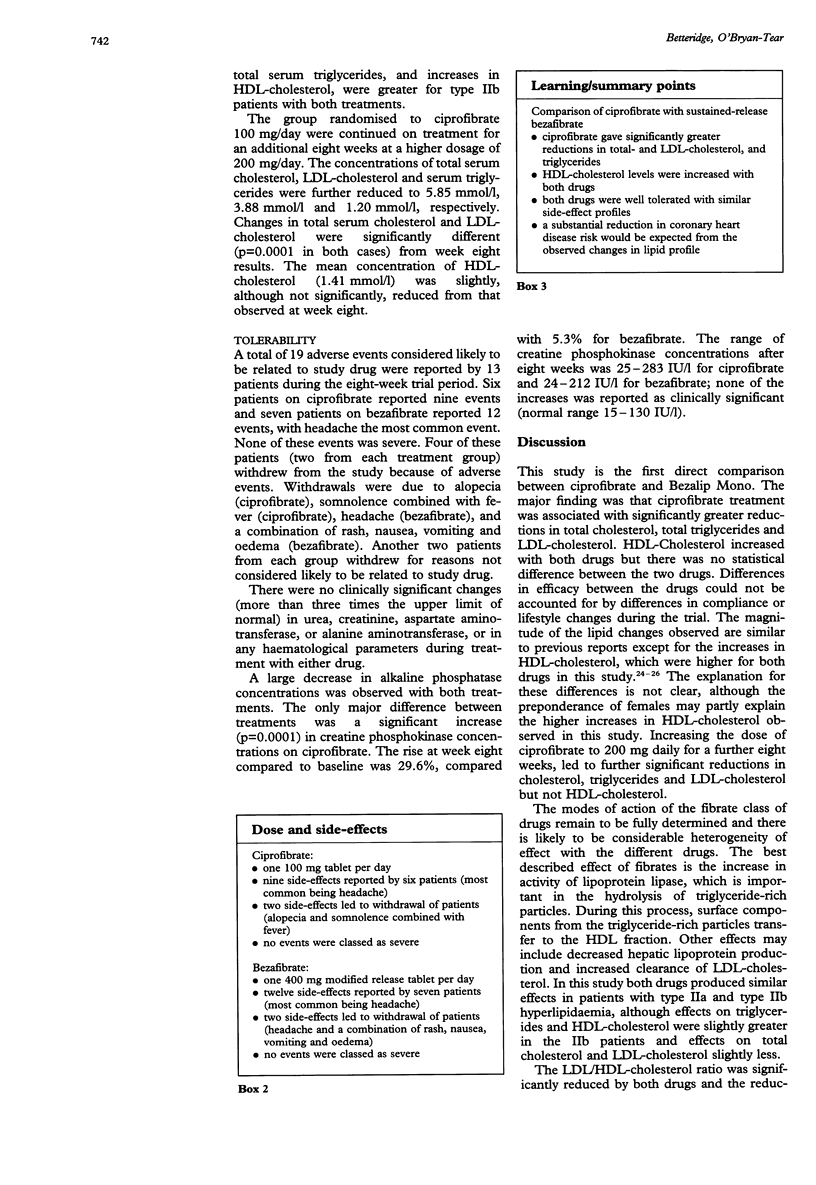
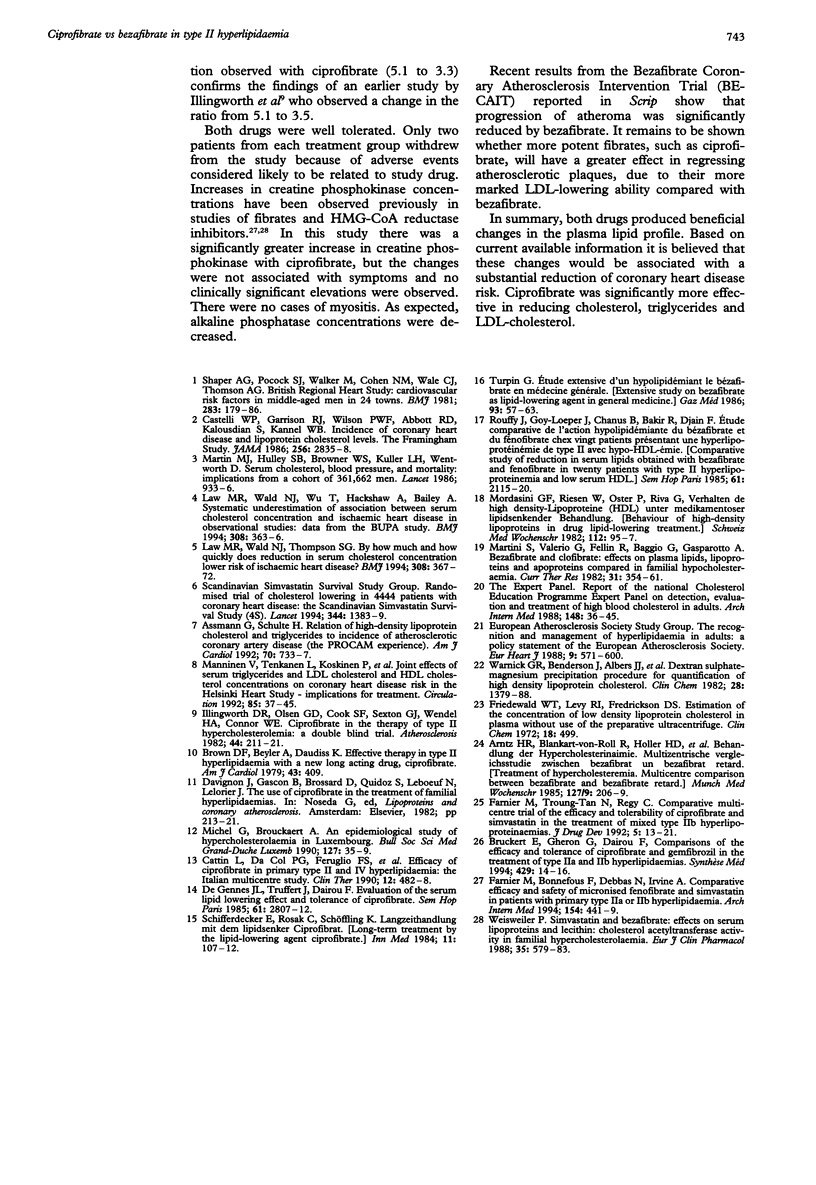
Selected References
These references are in PubMed. This may not be the complete list of references from this article.
- Assmann G., Schulte H. Relation of high-density lipoprotein cholesterol and triglycerides to incidence of atherosclerotic coronary artery disease (the PROCAM experience). Prospective Cardiovascular Münster study. Am J Cardiol. 1992 Sep 15;70(7):733–737. doi: 10.1016/0002-9149(92)90550-i. [DOI] [PubMed] [Google Scholar]
- Castelli W. P., Garrison R. J., Wilson P. W., Abbott R. D., Kalousdian S., Kannel W. B. Incidence of coronary heart disease and lipoprotein cholesterol levels. The Framingham Study. JAMA. 1986 Nov 28;256(20):2835–2838. [PubMed] [Google Scholar]
- Cattin L., Da Col P. G., Feruglio F. S., Finazzo L., Rimondi S., Descovich G., Manzato E., Zambon S., Crepaldi G., Siepi D. Efficacy of ciprofibrate in primary type II and IV hyperlipidemia: the Italian multicenter study. Clin Ther. 1990 Nov-Dec;12(6):482–488. [PubMed] [Google Scholar]
- Farnier M., Bonnefous F., Debbas N., Irvine A. Comparative efficacy and safety of micronized fenofibrate and simvastatin in patients with primary type IIa or IIb hyperlipidemia. Arch Intern Med. 1994 Feb 28;154(4):441–449. [PubMed] [Google Scholar]
- Friedewald W. T., Levy R. I., Fredrickson D. S. Estimation of the concentration of low-density lipoprotein cholesterol in plasma, without use of the preparative ultracentrifuge. Clin Chem. 1972 Jun;18(6):499–502. [PubMed] [Google Scholar]
- Illingworth D. R., Olsen G. D., Cook S. F., Sexton G. J., Wendel H. A., Connor W. E. Ciprofibrate in the therapy of type II hypercholesterolemia. A double-blind trial. Atherosclerosis. 1982 Aug;44(2):211–221. doi: 10.1016/0021-9150(82)90115-0. [DOI] [PubMed] [Google Scholar]
- Law M. R., Wald N. J., Thompson S. G. By how much and how quickly does reduction in serum cholesterol concentration lower risk of ischaemic heart disease? BMJ. 1994 Feb 5;308(6925):367–372. doi: 10.1136/bmj.308.6925.367. [DOI] [PMC free article] [PubMed] [Google Scholar]
- Law M. R., Wald N. J., Wu T., Hackshaw A., Bailey A. Systematic underestimation of association between serum cholesterol concentration and ischaemic heart disease in observational studies: data from the BUPA study. BMJ. 1994 Feb 5;308(6925):363–366. doi: 10.1136/bmj.308.6925.363. [DOI] [PMC free article] [PubMed] [Google Scholar]
- Manninen V., Tenkanen L., Koskinen P., Huttunen J. K., Mänttäri M., Heinonen O. P., Frick M. H. Joint effects of serum triglyceride and LDL cholesterol and HDL cholesterol concentrations on coronary heart disease risk in the Helsinki Heart Study. Implications for treatment. Circulation. 1992 Jan;85(1):37–45. doi: 10.1161/01.cir.85.1.37. [DOI] [PubMed] [Google Scholar]
- Martin M. J., Hulley S. B., Browner W. S., Kuller L. H., Wentworth D. Serum cholesterol, blood pressure, and mortality: implications from a cohort of 361,662 men. Lancet. 1986 Oct 25;2(8513):933–936. doi: 10.1016/s0140-6736(86)90597-0. [DOI] [PubMed] [Google Scholar]
- Michel G., Bouckaert A. Une étude épidémiologique de l'hypercholestérolémie au Grand-Duché de Luxembourg. Bull Soc Sci Med Grand Duche Luxemb. 1990;127(1):35–39. [PubMed] [Google Scholar]
- Shaper A. G., Pocock S. J., Walker M., Cohen N. M., Wale C. J., Thomson A. G. British Regional Heart Study: cardiovascular risk factors in middle-aged men in 24 towns. Br Med J (Clin Res Ed) 1981 Jul 18;283(6285):179–186. doi: 10.1136/bmj.283.6285.179. [DOI] [PMC free article] [PubMed] [Google Scholar]
- Warnick G. R., Benderson J., Albers J. J. Dextran sulfate-Mg2+ precipitation procedure for quantitation of high-density-lipoprotein cholesterol. Clin Chem. 1982 Jun;28(6):1379–1388. [PubMed] [Google Scholar]
- Weisweiler P. Simvastatin and bezafibrate: effects on serum lipoproteins and lecithin: cholesterol acyltransferase activity in familial hypercholesterolaemia. Eur J Clin Pharmacol. 1988;35(6):579–583. doi: 10.1007/BF00637592. [DOI] [PubMed] [Google Scholar]


